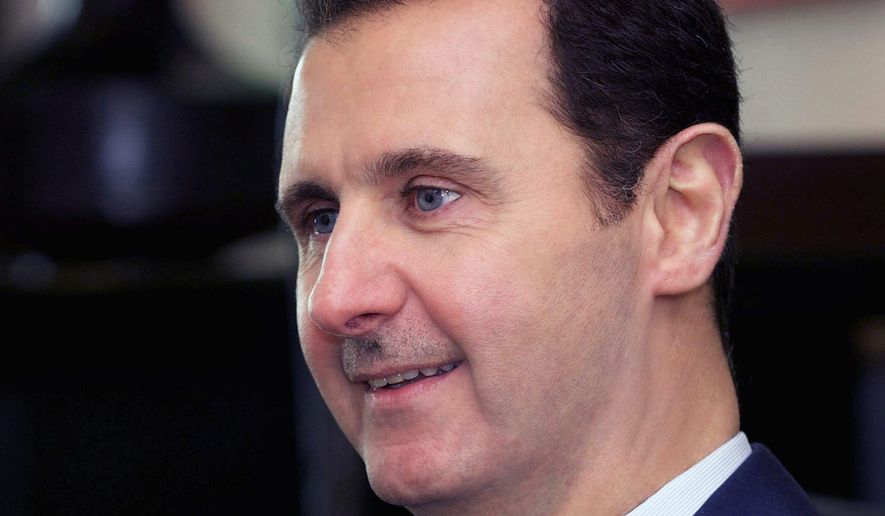Moscow is increasingly emerging as a center of diplomacy on Syria’s four-year-old civil war, with the Obama administration sending a key emissary to the Russian capital to discuss the conflict on Friday, following recent visits by high-level Saudi, Jordanian and Iranian officials — as well as key members of the Syrian political opposition.
After coordinating closely with Russia on the achievement of this summer’s nuclear accord with Iran, administration officials say they are seizing on an “opening” to strategize with Moscow toward ending the war that has left more than 240,000 people dead and millions displaced since 2011.
While State Department officials acknowledge there are still big obstacles preventing serious coordination with Russia — namely that Moscow has for years aligned with Iran on backing Syrian President Bahsar Assad and sharp differences over the standoff in Ukraine — the administration appears hopeful that it might be able to convince the Russians to shift their posture.
Hence the visit by U.S. Special Envoy for Syria Michael Ratney to Moscow on Friday — a trip that comes after Secretary of State John F. Kerry discussed Syria strategy during a series of meetings with Russian Foreign Minister Sergey Lavrov and Saudi Foreign Minister Adel al-Jubeir held earlier this month during visits to the Middle East and Asia.
The goal, according to a State Department statement, is to “work toward greater convergence of views among both foreign governments and the Syrians themselves on a political transition in Syria.”
State Department spokesman John Kirby, meanwhile, told reporters that administration officials “understand that the Russians have a different view in Syria than we do.”
“Frankly,” Mr. Kirby said Thursday, “their support to the Assad regime has been manifestly unhelpful to the crisis in Syria and has only served to embolden Assad to continue the deprivations in his own country against his own people. So we obviously have a different view here.”
But U.S. officials “hope that there is room for cooperation towards a political transition in Syria,” Mr. Kirby said. “What that’s going to look like, and how it’s going to manifest itself, we just don’t know right now.
“These discussions are just at their beginning, which is why it’s so important that Mr. Ratney is going,” he added. “We understand there’s a lot of work to do, but we think there’s an opening here for us to continue to work with Russia on a political transition in Syria.”
It’s not clear if the opening will lead to a new wave of international peace talks like those that brought together officials from several outside powers, as well as from Syria’s fractured opposition movement in 2012 and 2014.
The talks, which came to be known as “Geneva I” and “Geneva II,” ultimately fell apart as a result of infighting among the opposition, as well as disagreements over whether Mr. Assad’s ouster should be a precondition of any future negotiations.
Mr. Kirby’s comments suggested the administration is beginning to embrace the idea that Moscow will be a central player in anything relating to Syria going forward. And Russian President Vladimir Putin has engaged in an active round of diplomacy in recent weeks to assert Moscow’s role in fashioning a solution.
Russia hosted a delegation of Syria’s main opposition group, the Syrian National Coalition, in early August. And recent weeks saw high-level emissaries visit Moscow from nearly all the regional powers involved in the war — including Iran, Saudi Arabia and Jordan.
On his visit, King Abdullah of Jordan told Mr. Putin Russia’s role is “vital in bringing together all the rival sides to a negotiating table towards a peace solution.”
What’s unclear is whether Russia’s increased role will produce what Washington and its allies say they are seeking — the ouster of Mr. Assad in any peace deal.
When Saudi Foreign Minister Mr. al-Jubeir visited Moscow earlier this month, he was told by Mr. Lavrov it would be better to engage with the Assad government and the Syrian military in the ongoing fight against Islamic State extremists in Syria.
Mr. al-Jubeir’s response was that the Saudis, like the Obama administration, believe “Assad is part of the problem and not part of the solution.”
But Russia has leverage, since it is increasingly seen as a go-to interlocutor between the international community and Iran — the Assad regime’s other main backer, which the Obama administration has long insisted has no place in negotiations toward peace in Syria.
Russia’s ties to Iran have only grown since the inking of the nuclear accord in July. Iranian Foreign Minister Javad Zarif visited Moscow last week, just after his Jordanian and Saudi counterparts had appeared in the Russian capital.
Obama administration officials have not said whether or not they might accept a more active Iranian role in any future peace talks over Syria.
Furor over the prospect of Iranian participation erupted in Washington in 2014, after U.N. Secretary-General Ban Ki-moon announced that he had invited Iran to participate in the so-called “Geneva II” Syria peace conference.
Following heated pressure from Washington and its allies, the U.N. rescinded the invitation.
Mr. Kirby pushed aside questions on the issue Thursday, telling reporters that U.S. officials are “focused on what we’re focused on now, which is discussions with the Russians and with the Saudis, obviously, and with the U.N.”
“I’m not going to get ahead of anything one way or the other at this point in time,” he said.
• Guy Taylor can be reached at gtaylor@washingtontimes.com.




Please read our comment policy before commenting.